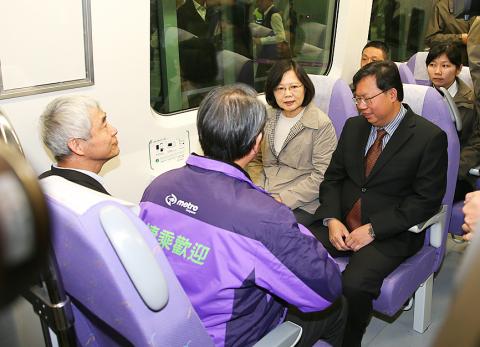President Tsai Ing-wen (蔡英文) yesterday urged government agencies to make sure everything is in order with the Mass Rapid Transit (MRT) line to Taiwan Taoyuan International Airport before it is launched next month to make the 20-year wait worthwhile.
Tsai made the remarks at Taoyuan High Speed Rail Station after riding an MRT train from the A1 stop at Taipei Main Station to the A13 Airport Terminal 2 Station and then continuing on to the high-speed rail station.
“The airport MRT line is the nation’s longest MRT system, spanning three special municipalities. It also connects the international airport with our high-speed rail, standard railway and Taipei MRT systems,” Tsai said.

Photo: CNA
With the airport line to start a trial run tomorrow before its official launch on March 2, Tsai said public transportation will reach a new milestone with the opening of the line, which brings Taoyuan into the MRT era.
The airport line is not only expected to improve travel throughout Taipei, New Taipei City and Taoyuan, but also offers the most convenient option yet for people living in other parts of the nation who want to travel abroad, she said.
“The launch of the airport MRT line brings two significant advances. The first is that it would ... provide further impetus for the development of Taoyuan,” Tsai said.
“A more convenient transportation system will change the city’s lifestyle. [Taoyuan] Mayor Cheng Wen-tsan (鄭文燦) has also announced plans to build more social housing units along the line to help relieve population pressure in the capital,” Tsai said.
The second is that the new line would significantly increase the number of tourists and other travelers using the airport, she said.
The completion of the line is the result of concerted effort by the central and local governments to solve problems and ensure the system’s stability, Tsai said.
“The public has waited 20 years. Let us make the wait worthwhile by making sure all preparatory work is completed,” she said.
Tsai said the new line’s first test would be to see how tourists from around the world evaluate it, as it will show travelers the progress Taiwan has made.
The trial run is to be conducted in two phases. From tomorrow to Feb. 15, the line will be open to groups from government agencies and other organizations with advanced reservations.
From Feb. 16 through March 1, it will be open to the public from 8am to 4pm daily.
Planning for the line began in 1996 and construction in 2006.

FREEDOM OF NAVIGATION: The UK would continue to reinforce ties with Taiwan ‘in a wide range of areas’ as a part of a ‘strong unofficial relationship,’ a paper said The UK plans to conduct more freedom of navigation operations in the Taiwan Strait and the South China Sea, British Secretary of State for Foreign, Commonwealth and Development Affairs David Lammy told the British House of Commons on Tuesday. British Member of Parliament Desmond Swayne said that the Royal Navy’s HMS Spey had passed through the Taiwan Strait “in pursuit of vital international freedom of navigation in the South China Sea.” Swayne asked Lammy whether he agreed that it was “proper and lawful” to do so, and if the UK would continue to carry out similar operations. Lammy replied “yes” to both questions. The

SECOND SPEECH: All political parties should work together to defend democracy, protect Taiwan and resist the CCP, despite their differences, the president said President William Lai (賴清德) yesterday discussed how pro-Taiwan and pro-Republic of China (ROC) groups can agree to maintain solidarity on the issue of protecting Taiwan and resisting the Chinese Communist Party (CCP). The talk, delivered last night at Taoyuan’s Hakka Youth Association, was the second in a series of 10 that Lai is scheduled to give across Taiwan. Citing Taiwanese democracy pioneer Chiang Wei-shui’s (蔣渭水) slogan that solidarity brings strength, Lai said it was a call for political parties to find consensus amid disagreements on behalf of bettering the nation. All political parties should work together to defend democracy, protect Taiwan and resist

By refusing to agree spending increases to appease US President Donald Trump, Spanish Prime Minister Pedro Sanchez threatened to derail a summit that NATO Secretary-General Mark Rutte needs to run smoothly for the sake of the military alliance’s future survival. Ahead of yesterday’s gathering in The Hague, Netherlands, things were going off the rails. European officials have expressed irritation at the spoiler role that Sanchez is playing when their No. 1 task is to line up behind a pledge to raise defense spending to 5 percent of GDP. Rutte needed to keep Spain in line while preventing others such as Slovakia

SHIFT PRIORITIES: The US should first help Taiwan respond to actions China is already taking, instead of focusing too heavily on deterring a large-scale invasion, an expert said US Air Force leaders on Thursday voiced concerns about the Chinese People’s Liberation Army’s (PLA) missile capabilities and its development of a “kill web,” and said that the US Department of Defense’s budget request for next year prioritizes bolstering defenses in the Indo-Pacific region due to the increasing threat posed by China. US experts said that a full-scale Chinese invasion of Taiwan is risky and unlikely, with Beijing more likely to pursue coercive tactics such as political warfare or blockades to achieve its goals. Senior air force and US Space Force leaders, including US Secretary of the Air Force Troy Meink and